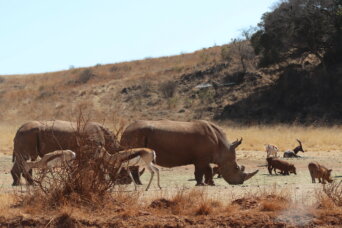- About
- Topics
- Picks
- Audio
- Story
- In-Depth
- Opinion
- News
- Donate
- Signup for our newsletterOur Editors' Best Picks.Send
Read, Debate: Engage.
| topic: | Conservation |
|---|---|
| located: | South Africa, Zimbabwe |
| editor: | Bob Koigi |
Across the globe, a paltry 11 per cent of the ranger workforce are women, in what has traditionally been viewed as a man’s job. Yet, as the world now becomes increasingly aware of the numerous threats faced by wildlife, among them sophisticated poaching, more boots on the ground are required.
Female rangers have made their mark in the conservation world, as seen in the South African all-female anti-poaching squad Black Mamba.
Patrolling the 50,000-hectare Balule Nature reserve that is part of the Greater Kruger National Park, and protecting some of the world’s most endangered animals, the rhino, female rangers have advanced the conservation cause and caught global attention. Black Mamba has gone on to inspire more such units across Africa, including Zimbabwe’s Akashinga, while being role models to their local communities.
This month, the world has celebrated the first Female Rangers Day, an event that, moving forward, will shine the spotlight on the pivotal role of women in conservation, encourage people to listen to the stories of female rangers, offer channels for their support and open up platforms for knowledge sharing.
Promoted by International charity organisation How Many Elephants, through the stewardship of conservationist Holly Budge, the event has now ignited debate about conservation in the COVID-19 era. With tourism numbers dwindling, which has had an impact on the number of rangers protecting wildlife, the numerous gains made in safeguarding the vulnerable animals could be dramatically eroded.
It is therefore crucial that individual, institutional and global support be dedicated to rangers, especially women, who continue to redefine what conservation means.
Image: Rckr88.

